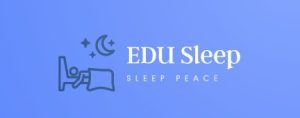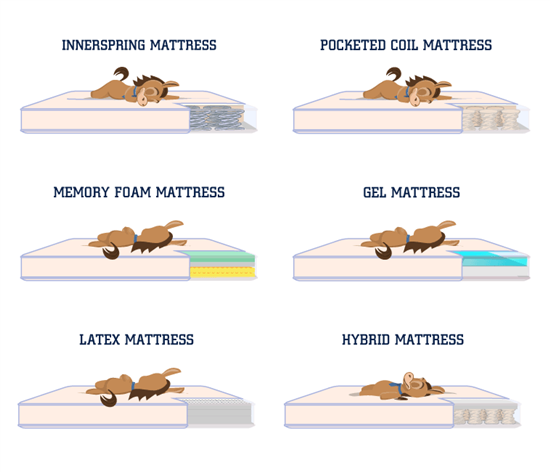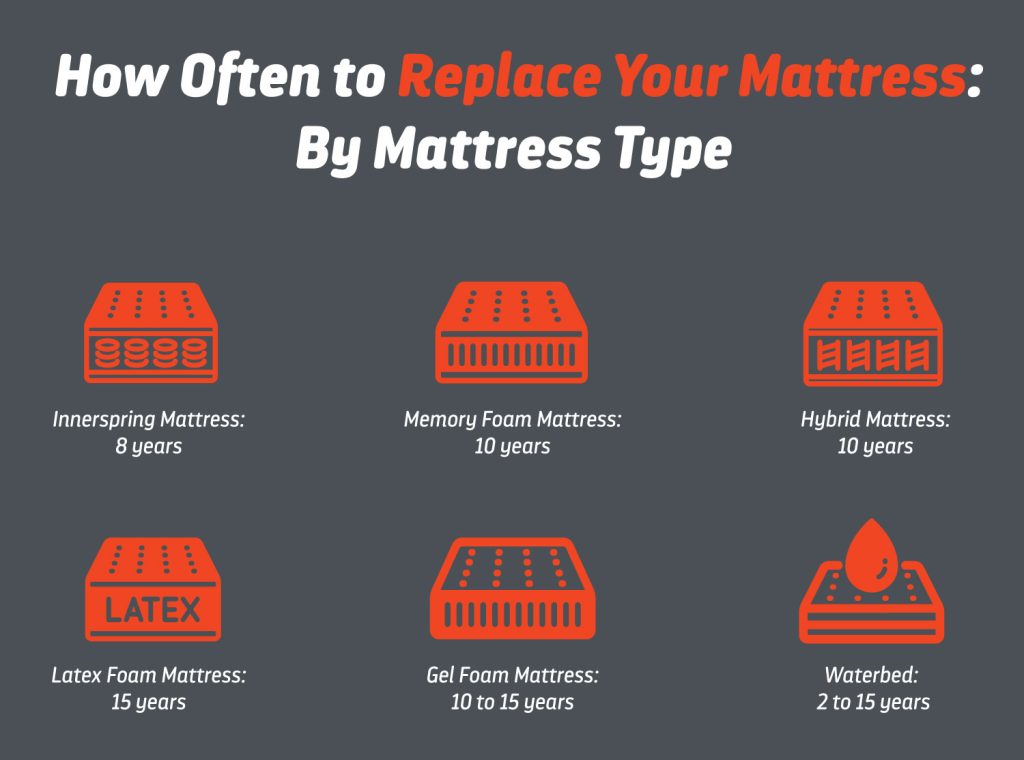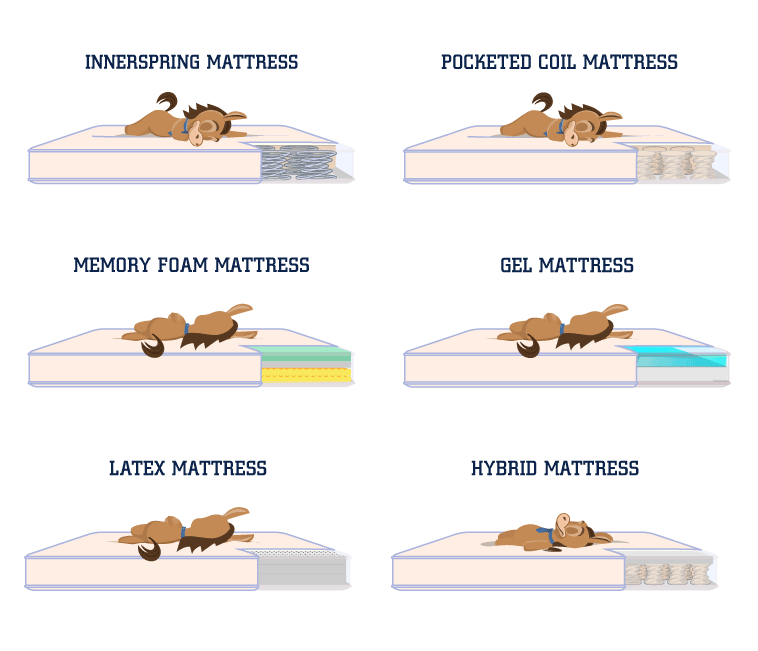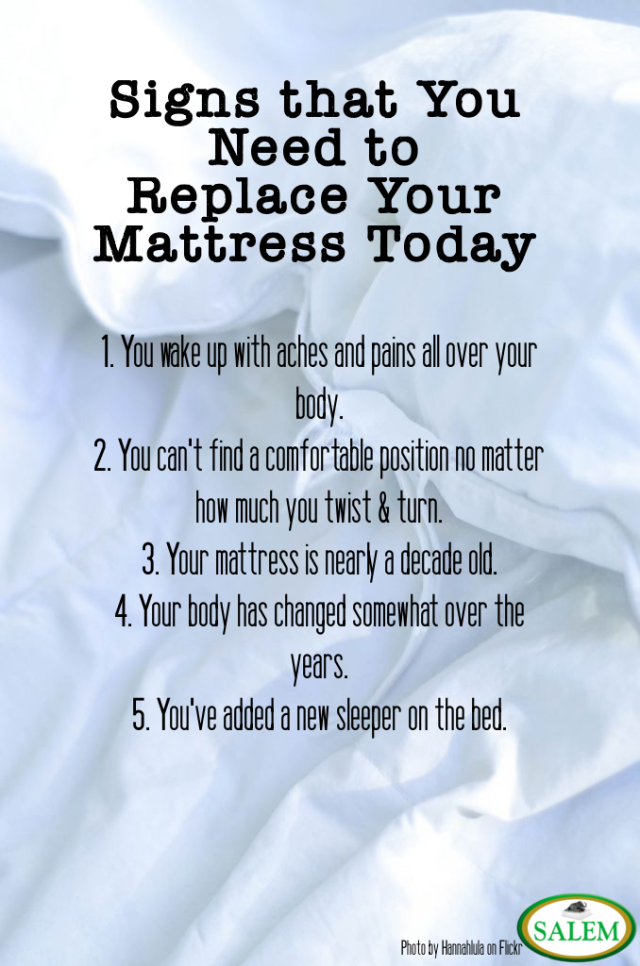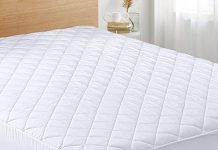Are you curious about the lifespan of your mattress? Wondering when it’s time to bid farewell to your trusty sleep companion?
In this article, we explore the topic of mattress replacement and provide insights on how often you should consider swapping out your mattress for a new one.
Discover the signs to look out for, the average lifespan of different mattress types, and tips for prolonging the life of your mattress.
Say goodbye to restless nights and hello to a well-rested future.
Review contents
Factors to Consider
When it comes to determining whether it’s time to replace your mattress, there are several factors you should consider.
These factors can help you evaluate the overall condition of your mattress and determine if it is still providing you with the support and comfort you need for a good night’s sleep.
Quality of the Mattress
The quality of your mattress plays a significant role in its lifespan. A high-quality mattress is typically made from durable materials and is designed to withstand regular use.
On the other hand, a lower-quality mattress may deteriorate more quickly and not provide the same level of comfort and support over time.
Type of Mattress
The type of mattress you have can also affect its lifespan. Different mattress types, such as innerspring, memory foam, latex, and hybrid mattresses, have varying levels of durability. Understanding the average lifespan of each type can help you gauge when it might be time for a replacement.
Amount of Use
The amount of use your mattress receives can impact its lifespan. Sleeping on your mattress every night may wear out faster than a mattress used less frequently.
Factors such as whether you eat or work on your mattress can also contribute to more wear and tear.
Changes in Health Needs
Your health needs can also influence when it’s time to replace your mattress. If you have experienced changes in your health, such as developing chronic pain or experiencing allergies or asthma, you may require a different type of mattress to accommodate these needs.
Therefore, it’s essential to reassess your mattress if you find yourself needing additional support or experiencing discomfort due to changes in your health.
Signs It’s Time for a Replacement
Recognizing the signs that it’s time to replace your mattress is crucial to ensuring you get the best sleep possible. Here are some common indicators that it may be time to shop for a new mattress.
Visible Wear and Tear
One of the most obvious signs that you need a new mattress is visible wear and tear. Look for signs such as frayed or torn fabric, lumps or bumps, or any damage to the mattress structure.
If your mattress looks worn out, it’s likely that the internal components are also deteriorating, which can affect its overall comfort and support.
Sagging or Dips
If you notice significant sagging or dips in your mattress, it’s a clear sign that it’s time for a replacement.
Over time, mattresses can lose their ability to maintain proper support, leading to sagging or sinking in certain areas. This can result in discomfort and a lack of proper spinal alignment during sleep.
Uncomfortable Sleep
One of the most essential functions of a mattress is to provide a comfortable sleep surface.
If you’re tossing and turning throughout the night, waking up with aches and pains, or not feeling well-rested, it may be a sign that your mattress is no longer meeting your needs. An uncomfortable sleep surface can significantly impact the quality of your sleep and overall well-being.
Allergies or Asthma
An old mattress can exacerbate your symptoms if you suffer from allergies or asthma. Over time, mattresses can accumulate allergens such as dust mites, mold, and pet dander, triggering allergic reactions or asthma attacks.
Notice an increase in your allergy or asthma symptoms. It may be time to consider replacing your mattress and investing in one that is hypoallergenic and resistant to allergens.
Average Lifespan of Different Mattress Types
Understanding the average lifespan of different mattress types can give you an idea of when you might expect to replace your current mattress.
While these lifespans can vary depending on the quality of the mattress and how well it is cared for, they provide a general guideline for when a replacement might be necessary.
Innerspring Mattress
Innerspring mattresses typically have an average lifespan of around 7-10 years.
These mattresses have a core of metal springs that provide support, with comfort layers on top. Over time, the springs may become less supportive, leading to sagging and less overall comfort.
Memory Foam Mattress
Memory foam mattresses have an average lifespan of 8-12 years. These mattresses are made from a viscoelastic foam that contours to your body, providing pressure relief and support.
However, memory foam can lose its ability to bounce back over time, decreasing support and comfort.
Latex Mattress
Latex mattresses are known for their durability and average lifespan of 10-15 years. Made from natural or synthetic latex, these mattresses offer support and comfort. Latex is known for its resilience, meaning it can retain its shape and support for an extended period.
Hybrid Mattress
Hybrid mattresses combine the benefits of different mattress materials, typically featuring an innerspring core with comfort layers of memory foam or latex. These mattresses generally have an average lifespan of 8-12 years, varying depending on the materials used.
Importance of Replacing Your Mattress
Replacing your mattress when it’s time can benefit your sleep quality, physical health, and overall well-being. Here are some key reasons why investing in a new mattress is essential when the old one no longer provides the necessary support and comfort.
Improved Sleep Quality
A worn-out mattress can significantly impact your sleep quality. When your mattress loses its ability to support your body correctly, you may experience discomfort, tossing and turning, and a lack of deep, restorative sleep. By replacing your mattress, you can improve your sleep quality and wake up feeling refreshed and rejuvenated.
Enhanced Physical Health
Sleeping on an unsupportive mattress can lead to various physical health issues. Improper spinal alignment caused by a sagging or worn-out mattress can result in back pain, neck pain, and muscle stiffness.
Choosing a new mattress that provides adequate support can alleviate these issues and promote better physical health.
Reduced Allergy Symptoms
A replacement can make a significant difference if your old mattress is triggering allergies or asthma symptoms.
Allergens such as dust mites, mold, and pet dander can accumulate in a mattress over time, causing flare-ups for those with sensitivities. Investing in a new mattress that is hypoallergenic and resistant to allergens can reduce the frequency and severity of these symptoms.
Caring for Your Mattress to Prolong Its Lifespan
Properly caring for your mattress can help extend its lifespan and ensure that it continues to provide the necessary support and comfort. Here are some essential tips to follow to maintain your mattress’s longevity.
Regularly Rotate and Flip
Rotating and flipping your mattress every few months can help distribute the wear and tear more evenly. It can prevent the sagging and body impressions that can occur from sleeping in the same position night after night. Follow the manufacturer’s guidelines for rotation and flipping, as some mattresses are not designed to be flipped.
Use a Mattress Protector
A mattress protector is an effective way to prevent stains, spills, and the accumulation of dust mites and allergens. A waterproof and breathable mattress protector can help keep your mattress clean and fresh, prolonging its lifespan.
Keep It Clean
Regularly cleaning your mattress can help maintain its condition and cleanliness. Vacuuming your mattress occasionally can remove dust, allergens, and debris that may have settled on the surface.
Spot-cleaning any stains with a mild detergent and warm water is also advisable. Refer to the manufacturer’s instructions for specific recommendations on cleaning your mattress.
Avoid Jumping or Sitting on the Edge
Excessive jumping or sitting on the edge of your mattress can put unnecessary strain on it and potentially shorten its lifespan. Avoid these activities to preserve the mattress’s integrity and prevent premature wear and tear.
Factors That May Affect Mattress Lifespan
Several factors can influence how long your mattress will last. Understanding these factors can give you a better idea of what to expect regarding lifespan and when to consider a replacement.
Body Weight
Body weight can affect how a mattress wears over time. Heavier individuals may exert more pressure on the mattress, potentially leading to faster wear and tear. If you’re heavier, replacing your mattress more frequently may be necessary.
Sleeping Alone or with a Partner
Sharing a mattress with a partner can increase the wear and tear it experiences. The pressure and movement from both individuals can impact the mattress’s support and longevity.
If you share your bed, consider opting for a mattress with motion isolation properties to minimize the effect of your partner’s movements.
Pets in Bed
Allowing pets to sleep on your mattress can add wear and tear. Pet hair, claws, and accidents can damage the mattress and decrease lifespan.
If possible, consider keeping pets off the bed or use a mattress protector to minimize the impact on your mattress.
Frequency of Moving
Frequent moves can contribute to mattress wear and tear. Moving mattresses can cause stress on the internal components and potentially compromise their structure.
If you have a history of moving frequently, it’s essential to carefully assess the condition of your mattress to determine if it’s time for a replacement.
Mattress Replacement Tips
When it’s time to replace your mattress, there are several tips to remember to ensure you find the right mattress for your needs.
Research and Testing
Take the time to research different mattress brands, types, and features to find the best match for your preferences.
Consider factors such as firmness, support, and materials. Additionally, visit mattress stores or take advantage of mattress trials to test different options and see how they feel for yourself.
Set a Budget
Determine a budget range for your mattress purchase. Mattresses come in a wide range of prices, so having a budget can help you narrow your options and find the best value for your money.
Consider Your Sleep Preferences
Each person has unique sleep preferences. Consider firmness, temperature regulation, and motion isolation to find a mattress that accommodates your needs. When replacing your mattress, it’s an opportunity to identify any issues you had with your previous mattress and find a new one that addresses those concerns.
Warranty and Return Policies
Before making a final decision, review the warranty and return policies offered by the mattress manufacturer. A generous warranty can provide peace of mind, knowing you’re protected against potential defects.
Additionally, a flexible return policy allows you to try the mattress in your home and return it if it doesn’t meet your expectations.
When to Seek Professional Advice
While the signs mentioned earlier can indicate that it’s time to replace your mattress, there are certain situations where seeking professional advice may be necessary.
Persistent Pain or Discomfort
It may be worth consulting with a healthcare professional if you’re experiencing persistent pain or discomfort that isn’t resolved by changing your mattress.
They can help identify any underlying issues or recommend specific mattress types that suit your needs better.
Increased Allergy or Asthma Symptoms
If you notice a significant increase in allergy or asthma symptoms without any other apparent cause, seeking medical advice is essential. A healthcare professional can help determine if your mattress may be a contributing factor and guide you in selecting a hypoallergenic mattress.
Inability to Sleep Well
If you consistently struggle to fall or stay asleep, and your mattress is not the root cause, it’s vital to address the underlying factors causing your sleep difficulties.
A healthcare professional or sleep specialist can help assess and diagnose any sleep disorders impacting your ability to sleep well.
Mattress is More Than 10 Years Old
While the lifespan of a mattress can vary based on factors such as quality and use, a general guideline is to consider replacing your mattress if it is more than ten years old.
Even if it appears in good condition, the internal components may have deteriorated over time, leading to decreased comfort and support.
Sustainable Disposal Options for Old Mattresses
Once you’ve decided to part ways with your old mattress and invest in a new one, it’s important to consider sustainable disposal options to reduce the environmental impact. Here are some eco-friendly ways to dispose of your old mattress:
Donate or Sell
If your mattress is still in good condition, consider donating or selling it. Many charitable organizations accept used mattresses that meet specific cleanliness and quality standards.
Additionally, online platforms or local classified ads can help you find potential buyers who may need a used mattress.
Recycle
Mattress recycling programs are becoming more common, making it easier to dispose of your old mattress responsibly.
These programs typically dismantle the mattress, separate the components, and recycle or repurpose them.
Repurpose
If you feel creative, you can repurpose your old mattress into various DIY projects. For example, you can use the foam or fabric to create pillows, cushions, or pet beds. This allows you to give your mattress a second life while minimizing waste.
Conclusion
Knowing when to replace your mattress is essential for getting the best sleep possible and maintaining your well-being.
By considering factors such as the quality of your mattress, signs of wear and tear, and changes in your health needs, you can make an informed decision about when to replace your mattress.
Remember that a mattress’s average lifespan depends on various factors, including its type, amount of use, and how well it is cared for. Investing in a new mattress when it’s time can improve your sleep quality, enhance your physical health, and reduce allergy symptoms.
To prolong your mattress’s lifespan, practice good mattress care, such as rotating and flipping regularly, using a mattress protector, and keeping it clean. Factors like body weight, sharing your bed with a partner, pets in bed, and moving frequency can also influence how long your mattress lasts.
When it’s time to replace your mattress, conduct thorough research, set a budget, consider your sleep preferences, and review warranties and return policies.
Additionally, seek professional advice if you experience persistent pain or discomfort, increased allergy or asthma symptoms, inability to sleep well, or have a mattress over 10 years old.
Lastly, consider sustainable disposal options for your old mattress, such as donating, selling, recycling, or repurposing.
By making environmentally conscious choices, you can decrease waste and minimize the impact on the planet.
